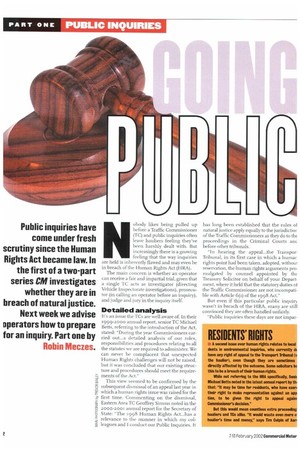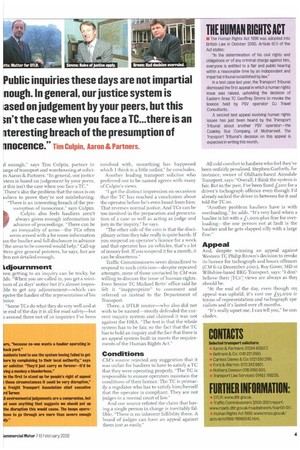N obody likes being pulled up before a Traffic Commissioner (TC)
Page 42

Page 43

If you've noticed an error in this article please click here to report it so we can fix it.
and public inquiries often leave hauliers feeling they've been harshly dealt with. But increasingly there is a growing feeling that the way inquiries arc, held is inherently flawed and may even be in breach of the Human Rights Act (HRA).
The main concern is whether an operator can receive a fair and impartial trial, given that a single TC acts as investigator (directing Vehicle Inspectorate investigations), prosecutor (in calling an operator before an inquiry), and judge and jury in the inquiry itself.
Detailed analysis
It's an issue the [Cs are well aware of. In their 1999-2000 annual report, senior TC Michael Betts, referring to the introduction of the Act, stated: "During the year Commissioners carried out...a detailed analysis of our roles, responsibilities and procedures relating to all the statutes we are required to administer. We can never be complacent that unexpected Human Rights challenges will not be raised, but it was concluded that our existing structure and procedures should meet the requirements of the Act."
This view seemed to be confirmed by the subsequent dismissal of an appeal last year in which a human rights issue was raised for the first time. Commenting on the dismissal, Eastern Area TC Geoffrey Simms noted in the 2000-2001 annual report for the Secretary of State: "The 1998 Human Rights Act...has a relevance to the manner in which my colleagues and I conduct our Public Inquiries. It has long been established that the rules ol natural justice apply equally to the jurisdictior of the Traffic Commissioners as they do to the proceedings in the Criminal Courts an before other tribunals.
"In hearing the appeal...the Transporl Tribunal, in its first case in which a humar rights point had been taken, adopted, vvithoul reservation, the human rights arguments pro. mulgated by counsel appointed by the Treasury Solicitor on behalf of your Depart. merit, where it held that the statutory duties ol the Traffic Commissioner are not incompati. ble with Article 6(1) of the 1998 Act."
But even if this particular public inquiry wasn't in breach of the H RA, many are still convinced they are often handled unfairly.
"Public inquiries these days are not impar
a enough," says Tim Culpin, partner in Large of transport and warehousing at solidrs Aaron & Partners. "In general, our justice stem is based on judgement by your peers, at this isn't the case when you face a TC." There's also the problem that the onus is on luliers to prove they're not misbehaving. "There is an interesting breach of the presumption of innocence," says Culpin. 0Culpin also feels hauliers aren't al ways given enough information in advance of proceedings. "There can be an inequality of arms—the TCs often seem armed with a lot more information ran the haulier and full disclosure in advance Fthe areas to be covered would help." Call-up tters give general pointers, he says, but are Ften not detailed enough.
Idjournment
yen getting to an inquiry can be tricky, he ids. "When you are called in, you get a miniium of 2I days' notice but it's almost imposble to get any adjournment—which can eprive the haulier of the representation of his hoice.
"Some TCs do what they do very well and at le end of the day it is all for road safety—but a around three out of to inquiries I've been involved with, something has happened which I think is a little unfair," he concludes.
Another leading transport solicitor who preferred not to be named agrees with many of C ulpi n's views. "I get the distinct impression on occasions that the TC has reached a conclusion about the operator before he's even heard from him. That reverses normal justice. And TCs can be too involved in the preparation and presentation of a case as well as acting as judge and jury in the inquiry," he says.
"The other side of the coin is that the disciplinary action they take really is quite harsh. If
you suspend an operator's licence for a week and that operator has 20 vehicles, that's a lot of money lost. If you suspend it for a month, it can be disastrous."
Traffic Commissioners seem disinclined to respond to such criticism—despite repeated
attempts, none of those contacted by CM was willing to discuss the issue of human rights. Even Senior TC Michael Betts' office said he felt it "inappropriate" to comment and referred us instead to the Department of Transport. There, a DTLR source—who also did not wish to be named—stoutly defended the cur
rent inquiry system and claimed it was not
against the H RA. "The test is that the whole system has to be fair, so the fact that the TC has to hold an inquiry and the fact that there is an appeal system built in meets the requirements of the Human Rights Act."
Conditions
CM's source rejected any suggestion that it was unfair for hauliers to have to satisfy a TC that they were operating properly. "The TC is responsible to ensure operators maintain the conditions of their licence. The TC is primarily a regulator who has to satisfy him/herself that the operator is compliant. They are not judges in a normal court of law." And our source refuted the claim that having a single person in charge is inevitably fallible. "There is no inherent fallibility there. A board of judges can have an appeal against them just as easily." All cold comfort to hauliers who feel they've been unfairly penalised. Stephen Garforth, for instance, owner of Oldham-based Ainsdale Transport, says: "Overall. I think the system is fair. But in the past, I've been fined izoo for a driver's tachograph offence even though I'd already sacked the driver in between for it and told the TC so.
"Another problem hauliers have is with overloading." he adds. "It's very hard when a haulier is hit with a ih000-plus fine for over loading the one person not at fault is the haulier and he gets slapped silly with a large fine."
Appeal
Arid, despite winning an appeal against Western TC Philip Brown's decision to revoke its licence for tachograph and hours offenceE (CM 6-12 December 2001), Roy Gover, MD oi Wiltshire-based BKG Transport, says: "I don't believe their [TCs'] views are always as the) should be.
"At the end of the day, even though nr) appeal was upheld, it's cost me f35,000 ir terms of representation and tachograph spe cialists and it's lasted over 18 months.
"It's really upset me, I can tell you," he con dudes.
















































































































































